Desde que era niña sentí interés por mis ancestros, por la historia familiar, quizá porque en casa había una colección de álbumes de papá en los que había fotos de distintas etapas de su vida, pero también fotos de sus padres, de sus hermanos, sus tíos y tías, algunas de ellas las conocí de niña porque sobrepasaron los 90 años. A los abuelos no los conocí, ni los paternos ni los maternos, ya habían muerto cuando yo nací. Sólo conocí a la abuela Trina, la madre de mi madre, y era muy pequeña cuando ella murió. Tengo de ella recuerdos muy vagos.
Ver esos álbumes de fotos sepias o en blanco y negro una y otra vez fue una de mis distracciones predilectas de la niñez y la adolescencia, y por supuesto le hacía preguntas a papá y conversábamos sobre alguna etapa de su vida o de sus familiares, que vivieron a finales del siglo XIX o comienzos del XX. Siempre tuve una clara consciencia de mi vínculo con quienes me antecedieron, que había heredado de ellos mi aspecto físico, pero también cosas más secretas, formas de comportamiento, hábitos, historias contadas o no contadas, como los hijos no reconocidos del abuelo Luis Martín, que eran también mis tíos, pero no tenían mi apellido.
Mis padres venían de mundos muy distintos, pero se enamoraron. Papá era caraqueño, quiso ser sacerdote, pero por razones de salud se retiró del seminario, y trabajó toda su vida en un banco. Mamá era interiorana, nació en San Sebastían de los Reyes, un pueblo de Provincia del estado Aragua, apenas cursó la escuela primaria y a los 21 años decidió venirse a Caracas, le aburría la vida de Provincia. Me contó mamá que inicialmente a papá le gustaba una de las hermanas de mamá, su hermana más llamativa, la tía Mercedes, rubia, de ojos verdes, alta, extrovertida, pero a mi tía no le gustaba mucho papá, y en algún momento que papá fue a buscar a mi tía, ella le dijo a mamá que lo atendiera ella y le dijera que ella no estaba. Papá venía a invitar a mi tía a un paseo, pero fue mamá la que terminó aceptando la invitación y terminaron enamoránose y casándose.
Papá en Ginebra, a finales de la década de 1930, cuando la relación de sus padres entró en crisis
Papá creció en Caracas, se educó en el Colegio Alemán, su padre era abogado, llegó desde Puerto Cabello muy joven con su esposa Adelina, mi abuela; fue funcionario público de la dictadura gomecista, fue secretario de Juan Vicente Gómez, de lunes a viernes permanecía en Maracay, porque a Gómez no le gustaba Caracas, la capital, y los fines de semana el abuelo venía a Caracas para estar con su familia.
La abuela era de carácter difícil y los abuelos terminaron divorciándose. En plena segunda guerra mundial la abuela logró que la familia, que estaba viviendo en Ginebra, donde el abuelo era cónsul, regresara a Caracas, porque el abuelo se había enamorado de Magdalena Tissot, una enfermera que lo había atendido cuando lo operaron de un cáncer de garganta que padecía.
Al divorciarse sus padres papá comenzó a trabajar para apoyar a su madre, sus hermanos menores eran niños aún y su hermano mayor se había alistado en el ejército. Al parecer, luego de separarse, la abuela no quiso ningún apoyo del abuelo. A pesar del carácter difícil de la abuela, papá siempre fue muy apegado con ella. En su juventud quería ser sacerdote, pero finalmente dejó el seminario y se fue a New York, invitado por su hermana Clemencia, quien cursaba estudios de Física de Radiaciones allí.
Al regresar, comenzó a trabajar en el área financiera, algunos años después, invitado por su hermano mayor, Martín, vivió un par de años en Francia, donde su hermano militar hacia el Estado mayor. En París estudió dibujo y pintura en la Academie Julian y se recorrió Francia en autostop, realizando diversos trabajos para cubrir sus gastos. Poco tiempo después de regresar a Venezuela, en 1958, conoció a mamá, ya entonces trabajaba en el Banco Venezolano de Crédito, y se casaron al año siguiente. Tuvieron cuatro hijas juntos, perdieron a una quinta, que murió al poco tiempo de nacer y estuvieron juntos hasta que papá murió a los 96 años en 2018.
Papá era un hombre callado, pero cordial, muy disciplinado y organizado, y al educarnos fue muy estricto. Él imponía su voluntad, en casa se hacía lo que él decía. Durante 50 años trabajó en un banco, hasta jubilarse y luego quedó como asesor medio tiempo, porque no se acostumbró a estar en casa. Fue un hombre de rutinas, que vivió enteramente dedicado a su familia. Salía de su trabajo directo a su casa y los fines de semana hacía mercado los sábados y los domingos nos llevaba a misa temprano y después de paseo o de visita a casa de familiares o amigos. No era un hombre de aventuras ni de grandes proyectos. Debido a que era políglota, hablaba además del español, alemán, inglés y francés, le ofrecieron en varias oportunidades trabajos muy bien remunerados y no los aceptó, estaba convencido de que el dinero corrompe a las personas.
A pesar de ser excesivamente disciplinado y sobreprotector también podía ser cariñoso, generoso, tenía un lado humorista. Siempre le costó expresar sus sentimientos, probablemente por haber recibido una educación muy estricta y tradicional, según la cual los hombres que se respetan no expresan sus sentimientos. Algo muy importante que nos enseñó a mis hermanas y a mí fue la importancia de actuar correctamente, ser honestas. Pero su desapego con el dinero, a pesar de dominar cuatro idiomas y de haber recibido una buena educación, nos ha marcado de una manera importante.
Durante muchos años tuve una actitud bastante estricta en mis relaciones interpersonales, en un contexto social en el que lo usual, por el contrario, es que las personas sean bastante flexibles y no sean estrictas con sus compromisos y relaciones. Eso me creó problemas profesionales y personales. Así también, honrar su concepción respecto al dinero y la riqueza me ha dificultado tener estabilidad financiera. Conscientemente, no comulgo con el rechazo de mi padre hacia los bienes materiales, hacia la riqueza, pero me administro muy mal, vivo saboteando mi estabilidad financiera, no tengo esa disciplina y organización que él tenía con el dinero. Es decir, creo que si he terminado honrando su rechazo al dinero de una manera indirecta.
Pero siempre le agradeceré a papá una educación basada en la honestidad, en la generosidad y en los valores positivos. Y ahora que ya no está, me doy cuenta que también aprendí de él a ser una persona organizada. Desde hace muchos años trabajo como free-lancer y necesariamente tengo que tener una agenda ordenada. Al igual que él me siento tranquila en mi zona de confort y me cuesta mucho hacer cambios bruscos que puedan sacarme de allí.
La vida de mamá fue mucho más estable y tranquila. Fue la tercera de ocho hermanos, como ya dije se crió en la Provincia, en un pueblo llamado San Sebastián de los Reyes, donde estudió la escuela primaria, cuando era adolescente su padre, el abuelo León, murió de cáncer. Pocos años después, a los ventiún años, decidé venirse a la capital, donde vivía uno de sus hermanos menores, el tío Alberto, que fue el primer ingeniero eléctrico de Venezuela y trabajaba en la Electricidad de Caracas.
Ya establecida en la capital, en la década del 50, trabajó en una de las áreas en las que las mujeres podían trabajar en esa época, como secretaria, inicialmente en el Ministerio de Agricultura y Cría y luego en la Electricidad de Caracas, donde trabajaba cuando conocío a papá. Luego de casarse, dejó de trabajar durante más de una década, pero cuando ya sus hijas estábamos en el bachillerato, volvió a trabajar para que pudiésemos estudiar en colegio privado. Mis hermanas mayores comenzaron sus estudios de bachillerato en liceos públicos, luego de haber estudiado primaria en colegios de monjas y la experiencia no fue agradable.
Mamá ha sido una mujer de carácter difícil, pero así también una mujer conversadora, de esas personas que hablan hasta con las piedras. Nunca ha sido una mujer afectuosa y siempre tenía alguna razón para quejarse o pelear. De hecho, la recuerdo peleando con frecuencia con papá cuando yo era niña o adolescente y hasta el día en que papá murió. Sus cuatro hijas tuvimos una relación muy difícil con ella. No fue un modelo positivo para nosotros como mujer, como esposa o como madre. Prefiero no repetir algunas de las frases que le escuchamos cuando éramos niñas. Pienso que probablemente fue una persona bipolar no diagnósticada, por el mal manejo que ha tenido de sus emociones y para ella fue una carga muy pesada criar cuatro hijas, y un dolor muy grande, perder a la hija que murió al mes de nacida, Cristina. No fue feliz en su rol de madre.
¿Cómo se consolidó eso en mí?
Tener una imagen tan negativa de ser mujer, esposa y madre me marcó profundamente, y a mis tres hermanas también. Todas hemos tenido una autoestima baja, la única en casarse fue mi hermana mayor, Margarita, y su matrimonio terminó en divorcio. Yo, particularmente, he tenido una relación difícil con el mundo. De niña fui muy tímida y callada, me costaba relacionarme con otras personas, especialmente si no eran de mi entorno más cercano. En la escuela me hicieron bullyng en la escuela primaria y en el bachillerato. Pero tuve la suerte de tener unos pocos amigos que me dieron su afecto, y me querían como yo era, una niña siempre callada y triste. Finalmente, cuando inicié mis estudios de Literatura en la Universidad encontré a personas con las que me entendía mejor.
¿Qué les puedo decir de mis desastres en el amor? He tenido una sola relación de pareja más o menos estable y fue un desastre, imaginen la clase de enamoramientos que puede tener una mujer que no se quiere a sí misma. Ni mi padre ni mi madre me decían cosas positivas, a pesar de que solía portarme bien y tenía buenas calificaciones en la escuela. Mi madre, que como mujer debía ser mi ejemplo, no se quería a sí misma, y si nos quiso nunca lo demostró. Nos cuidó como una obligación que no podía eludir, porque se había casado y le tocaba, nunca lo hizo con afecto o alegría. Nos decía con frecuencia cosas que nos podían herir y aunque ella no nos pegaba fastidiaba a papá para que él lo hiciera. Papá agredió mucho a mis hermanas mayores, que eran rebeldes, por culpa de mamá. A mí no, porque yo era muy tranquila y ensimismada y él siempre sintió un afecto especial por mí. Pero algo sí tenía mi madre que mi padre nunca tuvo, la fortaleza y la valentía de cambiar su vida y enfrentar las dificultades con coraje.
Aceptarme, valorarme y quererme a mí misma, aceptar esa situación que vivimos mis hermanas y yo con mi madre, me ha costado décadas. Cuidarla y tratarla con afecto de corazón, ahora que tiene 94 años y está inválida, ha sido posible luego de muchos años de terapia psicológica, psiquiátrica y sobre todo de mucha meditación. Ha sido un largo camino de la mente al corazón. Mis hermanas, aunque también tienen que atenderla, no han podido perdonarla.
Qué hondo y largo este viaje en el tiempo, desde mis ancestros y hasta mi psicodinámica familiar súper disfuncional. Sólo me queda agradecer tu lectura, estimado lector o lectora, que hayas logrado llegar hasta aquí. El tema de las constelaciones familiares es muy complejo, nuestra historia familiar y la de nuestros ancestros, determina nuestras relaciones y en muchos casos es necesario un arduo trabajo para sanar las heridas que esas historias dejan en nosotros.
Es muy importante aprender a darle amor a esa niña o ese niño herido que llevamos dentro, que recibió maltrato físico o psicológico, porque generalmente, cuando no lo haces, terminas repitiendo la historia, terminas maltratando a quienes te rodean, y especialmente a tus hijos, si los tienes. Y es también muy importante poder perdonar, hace mucho daño tener resentimiento o tener odio en tu corazón. Generalmente quien maltrata recibió maltrato, generalmente quien no recibió afecto no sabe darlo. Vivimos en una cultura que no nos enseña a manejar nuestras emociones.
Gracias a
@Astrea quien me invitó a participar de esta iniciativa y a
@selftheist quien la propuso.

English version
Since I was a child I was interested in my ancestors, in family history, perhaps because at home there was a collection of my father's albums in which there were photos of different stages of his life, but also photos of his parents, his siblings, his uncles and aunts, some of them I knew as a child because they were over 90 years old. I did not know her grandparents, neither her paternal nor her maternal grandparents, they had already died when I was born. I only knew grandmother Trina, my mother's mother, and I was very young when she died. I have very vague memories of her.
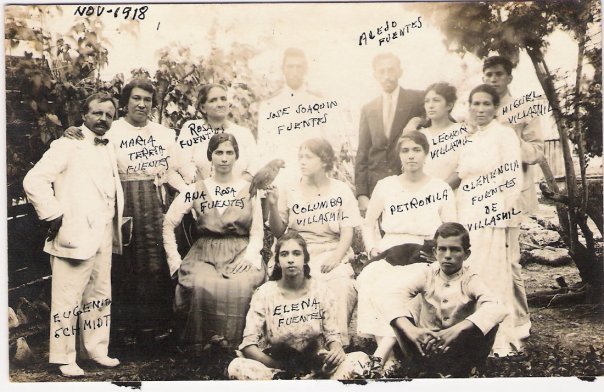
paternal branch ancestors
photo of my family album
Looking at those sepia or black and white photo albums over and over again was one of my favorite distractions of childhood and adolescence, and of course I would ask Dad questions and we would talk about some stage of his life or of his relatives, who lived at the end of the 19th century or the beginning of the 20th. I always had a clear conscience of my link with those who preceded me, that I had inherited from them my physical appearance, but also more secret things, forms of behavior, habits, told or untold stories, like the unrecognized children of grandfather Luis Martin, who were also my uncles, but did not have my surname.
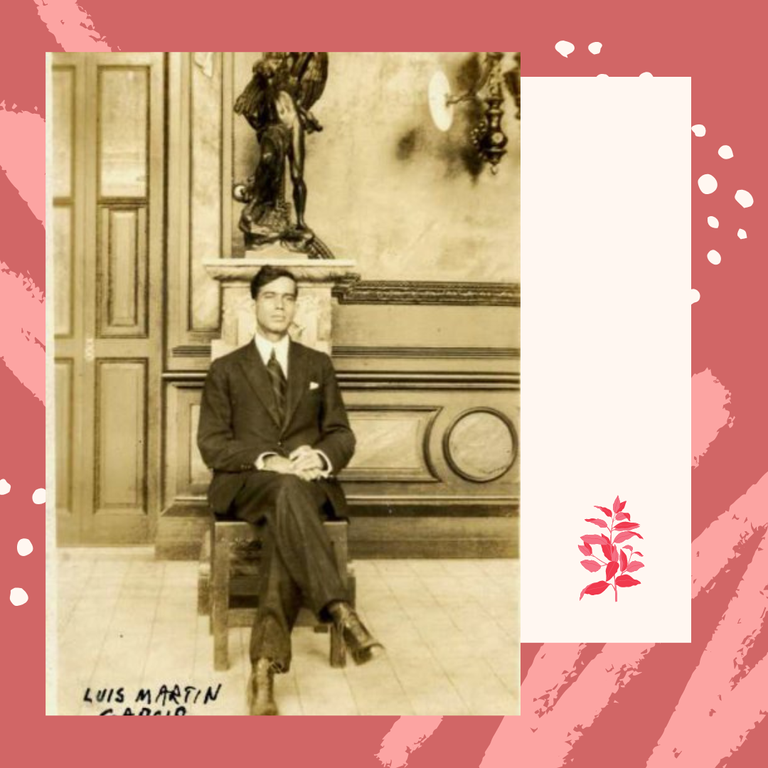
paternal Grandfather, Luis Martín García
photo of my family album
My parents came from very different worlds, but they fell in love. Dad was from Caracas, he wanted to be a priest, but for health reasons he retired from the seminary, and worked all his life in a bank. Mom was from the interior, born in San Sebastían de los Reyes, a provincial town in the state of Aragua, she barely attended elementary school and at the age of 21 she decided to come to Caracas, she was bored with life in the provinces. Mom told me that initially Dad liked one of Mom's sisters, her most striking sister, Aunt Mercedes, blonde, green-eyed, tall, extroverted, but my aunt did not like Dad very much, and at some point when Dad went to look for my aunt, she told Mom to take care of him and tell him that she was not there. Dad came to invite my aunt for a walk, but it was mom who ended up accepting the invitation and they ended up falling in love and getting married.
Dad
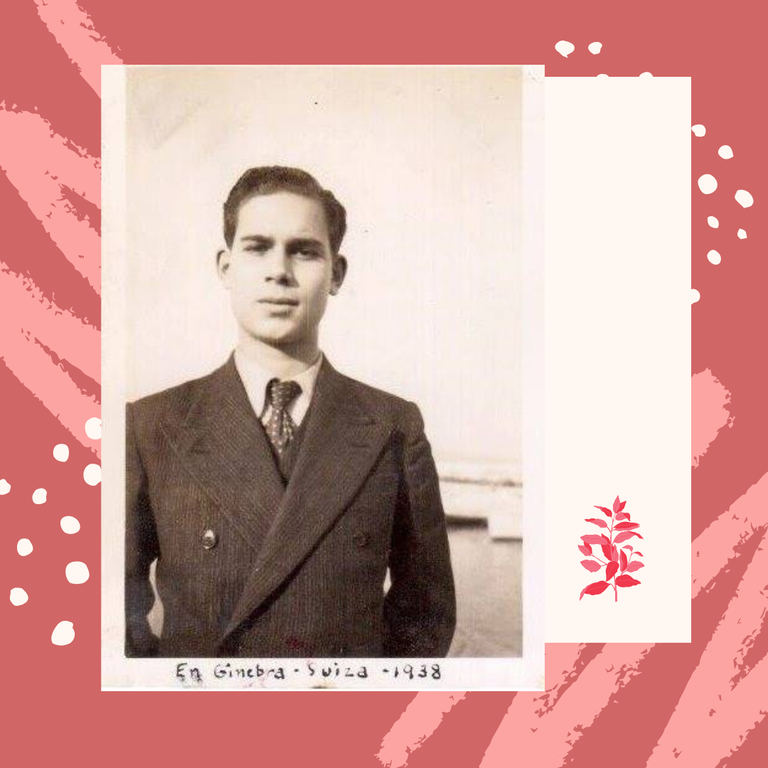
Dad in Geneva in the late 1930s, when his parents' relationship went into crisis.
Dad grew up in Caracas,he was educated at the German School, his father was a lawyer, he came from Puerto Cabello very young with his wife Adelina, my grandmother; he was a public official of the Gomez dictatorship, he was secretary of Juan Vicente Gomez, from Monday to Friday he stayed in Maracay, because Gomez did not like Caracas, the capital, and on weekends grandfather came to Caracas to be with his family.
Grandmother was a difficult character and the grandparents ended up divorcing. In the middle of World War II, the grandmother managed to get the family, who were living in Geneva, where the grandfather was consul, to return to Caracas, because the grandfather had fallen in love with Magdalena Tissot, a nurse who had cared for him when he was operated on for throat cancer.
When his parents divorced Dad started working to support his mother, his younger siblings were still children and his older brother had enlisted in the army. Apparently, after they separated, Grandma did not want any support from Grandpa. Despite Grandma's difficult character, Dad was always very close to her. In his youth he wanted to become a priest, but finally left the seminary and went to New York, invited by his sister Clemencia, who was studying Radiation Physics there.
Some years later, at the invitation of his older brother Martin, he lived for a couple of years in France, where his military brother was on the General Staff. In Paris he studied drawing and painting at the Academie Julian and traveled through France by hitchhiking, doing various jobs to cover his expenses. Shortly after returning to Venezuela, in 1958, he met his mother, by then working at the Banco Venezolano de Credito, and they married the following year. They had four daughters together, lost a fifth, who died shortly after birth, and were together until Dad died at the age of 96 in 2018.
How was Dad?
Dad was a quiet man, but cordial, very disciplined and organized, and in educating us he was very strict. He imposed his will, at home we did what he said. For 50 years he worked in a bank, until he retired and then he became a part-time advisor, because he did not get used to being at home. He was a man of routines, who lived entirely dedicated to his family. He left his work directly to his home and on weekends he went to the market on Saturdays and on Sundays he would take us to mass early and then go for a walk or visit family or friends. He was not a man of adventures or big projects. Because he was a polyglot, he spoke Spanish, German, English and French, he was offered on several occasions very well paid jobs and he did not accept them, he was convinced that money corrupts people.
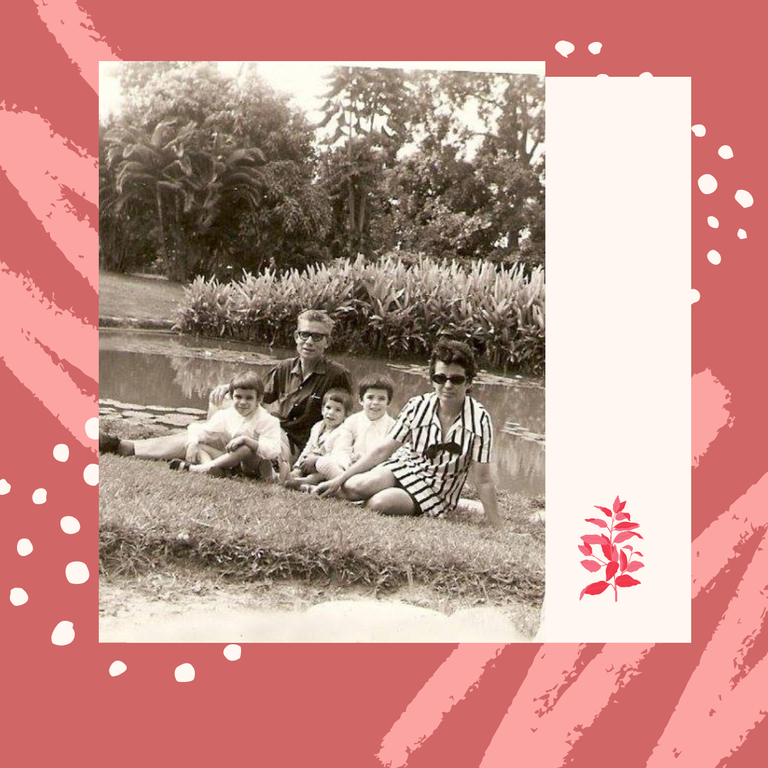
family walk to Parque del Este, 1970
photo from my family album
Despite being excessively disciplined and overprotective, he could also be affectionate, generous and had a humorous side. He always found it difficult to express his feelings, probably because he had received a very strict and traditional upbringing, according to which men who respect themselves do not express their feelings. One very important thing he taught my sisters and me was the importance of acting correctly, being honest. But her detachment with money, despite her mastery of four languages and having received a good education, has marked us in an important way.
How did that solidify in me?
For many years I had a rather strict attitude in my interpersonal relationships, in a social context in which the usual, on the contrary, is that people are quite flexible and not strict with their commitments and relationships. This created professional and personal problems for me. Also, honoring their conception of money and wealth has made it difficult for me to have financial stability. Consciously, I do not share my father's rejection towards material goods, towards wealth, but I manage myself very badly, I live sabotaging my financial stability, I do not have that discipline and organization that he had with money. That is to say, I think I have ended up honoring his rejection of money in an indirect way.
Pero siempre le agradeceré a papá una educación basada en la honestidad, en la generosidad y en los valores positivos. Y ahora que ya no está, me doy cuenta que también aprendí de él a ser una persona organizada. Desde hace muchos años trabajo como free-lancer y necesariamente tengo que tener una agenda ordenada. Al igual que él me siento tranquila en mi zona de confort y me cuesta mucho hacer cambios bruscos que puedan sacarme de allí.
Mom
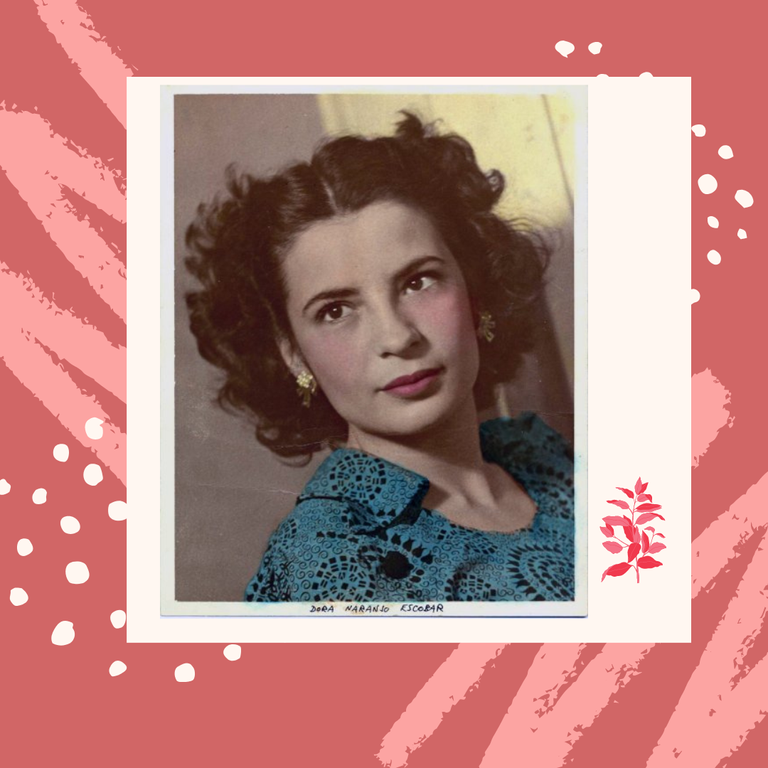
Mom in her youth
Photo from my family album
Mom's life was much more stable and peaceful. She was the third of eight siblings, as I said, she grew up in the province, in a town called San Sebastían de los Reyes, where she studied elementary school, when she was a teenager her father, grandfather León, died of cancer. A few years later, at the age of twenty-one, she decided to come to the capital, where one of her younger brothers lived, Uncle Alberto, who was the first electrical engineer in Venezuela and worked for Electricidad de Caracas.
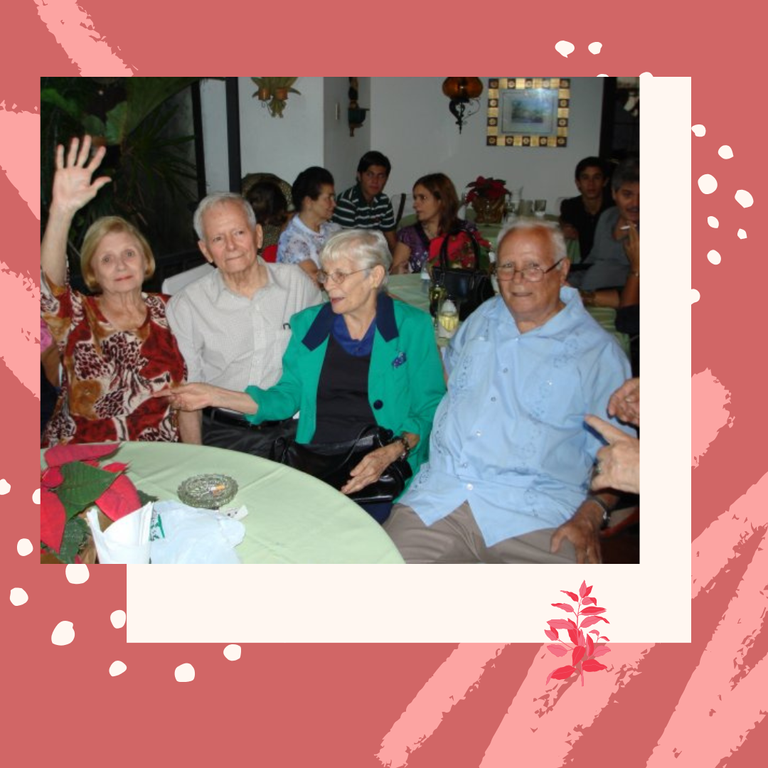
Mom some years ago with her brothers Alberto, Mercedes and Marco.
Photo from my family album
Already established in the capital, in the 50's, she worked in one of the areas where women could work at that time, as a secretary, initially in the Ministry of Agriculture and Breeding and then in the Electricity of Caracas, where she was working when she met dad. After getting married, she stopped working for more than a decade, but when her daughters were already in high school, she went back to work so that we could study in a private school. My older sisters began their high school studies in public high schools, after having studied elementary school in nuns' schools, and the experience was not pleasant.
How was mum?
Mom has been a woman of difficult character, but also a talkative woman, one of those people who even talk to stones. She has never been an affectionate woman and always had some reason to complain or fight. In fact, I remember her fighting often with dad when I was a child or teenager and even the day dad died. Her four daughters we had a very difficult relationship with her. She was not a positive role model for us as a woman, as a wife or as a mother. I prefer not to repeat some of the phrases we heard from her when we were children. I think she was probably an undiagnosed bipolar person, because of the bad management she has had of her emotions and for her it was a very heavy burden to raise four daughters, and a very big pain, to lose the daughter who died a month after she was born, Cristina. She was not happy in her role as a mother.
How did that solidify in me?
Having such a negative image of being a woman, wife and mother marked me deeply, and my three sisters as well. All of us have had low self-esteem, the only one to marry was my older sister, Margarita, and her marriage ended in divorce. I, in particular, have had a difficult relationship with the world. As a child I was very timid and quiet, it was hard for me to relate to other people, especially if they were not from my close environment. At school I was bullied in elementary school and high school. But I was lucky to have a few friends who gave me their affection, and loved me as I was, a quiet and sad girl. Finally, when I began my studies of Literature at the University I found people with whom I understood myself better.
What can I tell you about my disasters in love? I have had only one more or less stable relationship and it was a disaster, imagine the kind of crushes a woman who doesn't love herself can have. Neither my father nor my mother would say positive things to me, even though I used to behave well and had good grades in school. My mother, who as a woman was supposed to be my example, did not love herself, and if she loved us she never showed it. She took care of us as an obligation she could not shirk, because she had married and it was her turn, she never did it with affection or joy. She often said things to us that could hurt us and although she didn't hit us she nagged Dad to do it. Dad did a lot of bullying to my older sisters, who were rebellious, because of Mom. Not me, because I was very quiet and self-absorbed and he always felt a special affection for me. But my mother had something that my father never had, the strength and courage to change his life and face difficulties with courage.
To accept, value and love myself, to accept the situation that my sisters and I lived through with my mother, has taken me decades. Taking care of her and treating her with heartfelt affection, now that she is 94 years old and disabled, has been possible after many years of psychological and psychiatric therapy, and above all, a lot of meditation. It has been a long road from the mind to the heart. My sisters, although they also have to take care of her, have not been able to forgive her.
What a deep and long journey through time, from my ancestors to my super dysfunctional family psychodynamics. It only remains for me to thank you for reading, dear reader, that you have managed to get here. The subject of family constellations is very complex, our family history and that of our ancestors, determines our relationships and in many cases hard work is necessary to heal the wounds that these stories leave in us.
It is very important to learn to give love to that hurt girl or boy that we carry inside, who received physical or psychological abuse, because generally, when you do not do it, you end up repeating the story, you end up abusing those around you, and especially your children, if you have them. And it is also very important to be able to forgive, it hurts a lot to have resentment or hatred in your heart. Generally those who mistreat received mistreatment, generally those who did not receive affection do not know how to give it. We live in a culture that does not teach us to manage our emotions.
Thanks to
@Astrea who invited me to participate in this initiative and to
@selftheist who proposed it.
Translation to english with Deepl.com

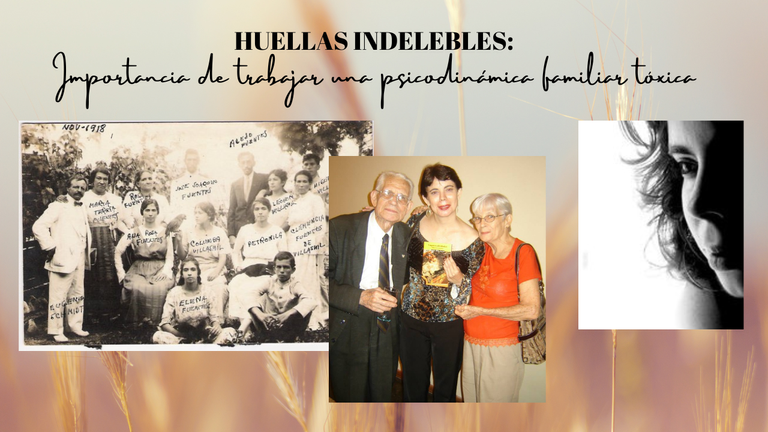

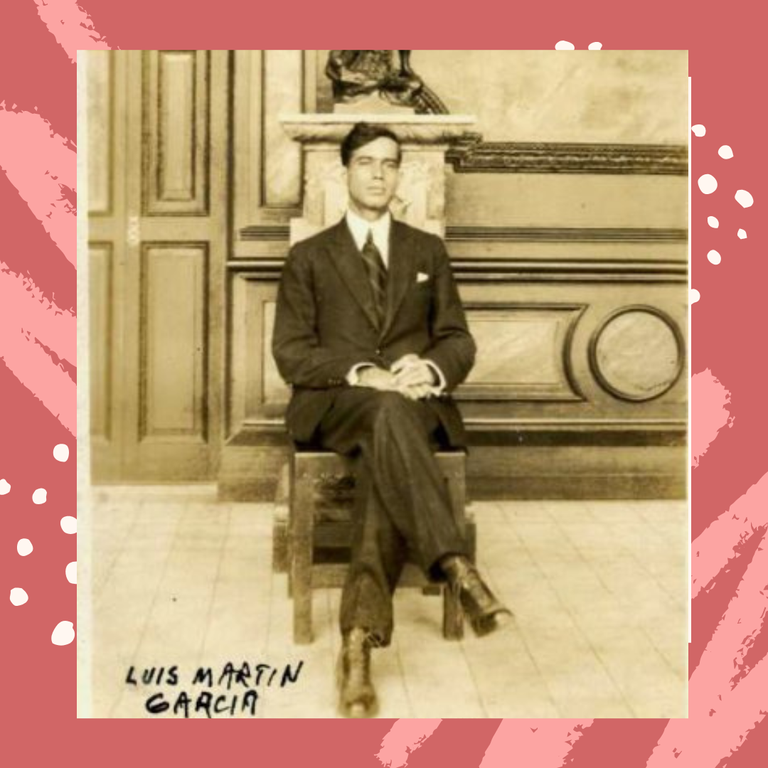
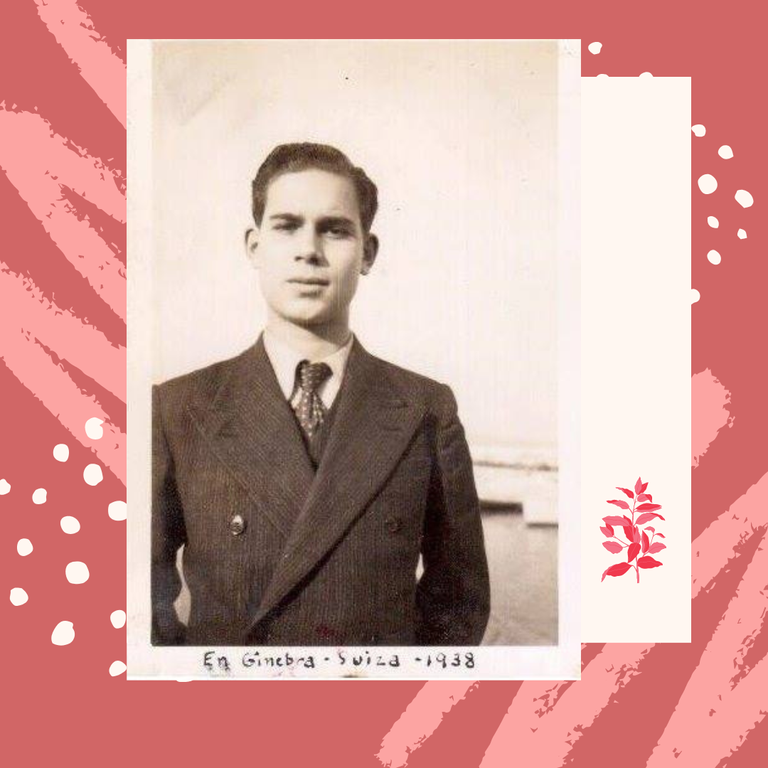
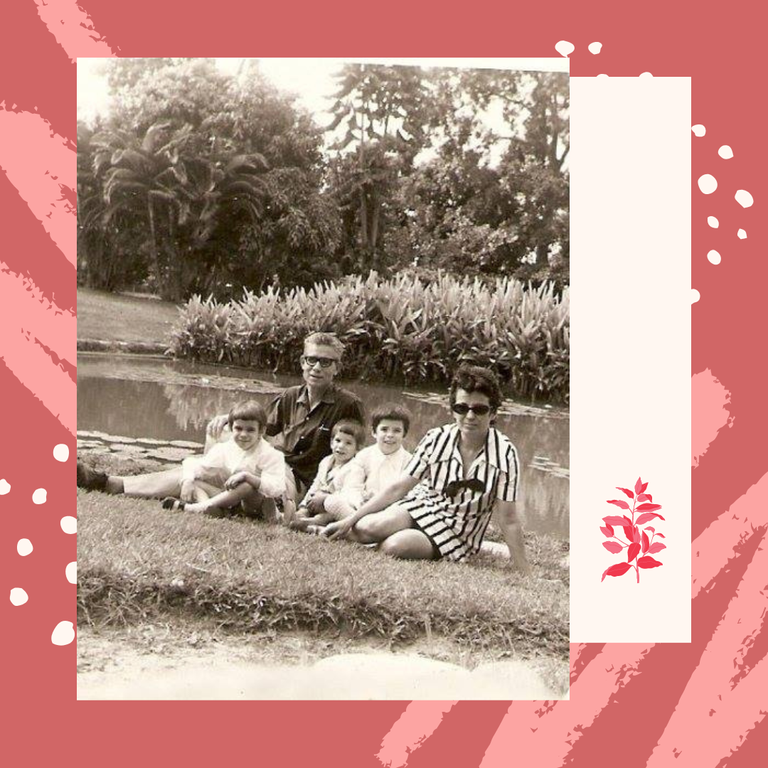










Congratulations @beaescribe! You have completed the following achievement on the Hive blockchain And have been rewarded with New badge(s)
Your next target is to reach 200 posts.
You can view your badges on your board and compare yourself to others in the Ranking
If you no longer want to receive notifications, reply to this comment with the word
STOPTo support your work, I also upvoted your post!
Check out our last posts:
Thank you @hivebuzz 😀
Keep up the fantastic work @beaescribe! Your dedication and hard work will pay off when you reach your target.
Gracias por regalarnos tan hermosísimo post lleno de sabias reflexiones y compartir tu historia con nosotros.
Muchas gracias a ti por invitarme a participar en la iniciativa. Me contenta que hayas disfrutado la lectura. Las huellas de nuestros padres y ancestros pueden ser determinantes en nuestras vidas. También en tu post podemos verlo. Un abrazo
Formidable, relato de tu historia familiar, estimada hiver, @beaescribe. Eres una persona interesante
Muchas gracias por tu lectura estimado @hiramdo
Me encantó leerte, no cualquiera se atreve a compartir cosas tan personales de manera tan abierta. La historia que nos cuentas aquí es la historia de muchos más, la mayoría de las familias tienen psicodinámicas disfuncionales o tóxicas y te felicito por haber buscado ayuda, no todo el mundo lo hace ni se atreve por todo el tabú que siempre ha existido.
Es increíble cómo las mujeres maltratan más, sobre todo, a su mismo género 😱, es cierto que pueden existir también patologías mentales que influyan y esto, mezclado con las taras de una crianza tóxica, son el caldo de cultivo para crear a un abusador o abusadora en potencia de cualquier índole.
Pero, de igual forma, existe el pensamiento crítico, es decir, ¿hasta qué punto no se dan cuenta de lo que están haciendo?, ¿de verdad no llegan a suponer que están dañando a los demás? Yo me debato aún pensando en eso porque pienso que sí se dan cuenta, solo que no les da la gana de cambiar ni de sanarse, mi punto es que de niños se puede entender, pero de adultos no se justifica una conducta de tal magnitud.
Te mando un abrazo, qué bueno que estás sanando, eso no es fácil y más el tener que cuidar a la persona que te dañó, entiendo que tus hermanas no puedan perdonarla. ¡Saludos, @beaescribe 🤗!
Estimada @vezo Gracias por tu lectura y tu comentario. Me animé a participar en la iniciativa y a hablar claramente sobre el tema porque pienso que puede haber personas que se pueden identificar. El mayor problema es que esas situaciones de maltrata físico y psicológico suelen transmitirse de una generación a otra cuando no las sanas. Es muy importante sanarlas. Mis hermanas que tuvieron hijas, yo no las tuve, también fueron maltratadoras. Una de ellas ha logrado sanar su relación con su hija, pero la otra no. Es muy importante poder sanar.